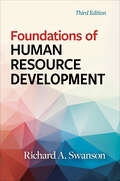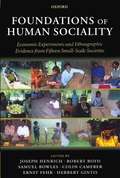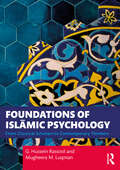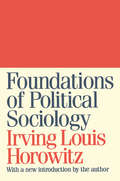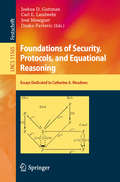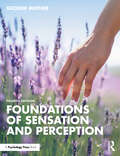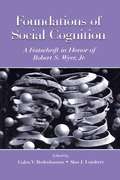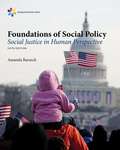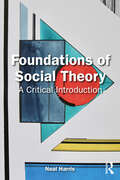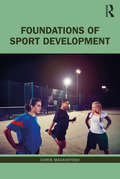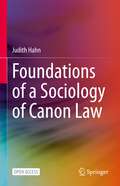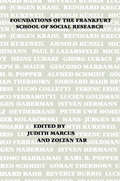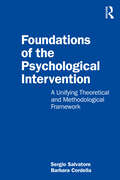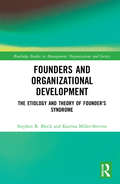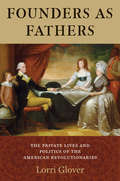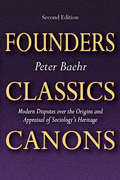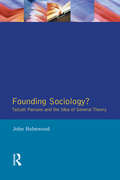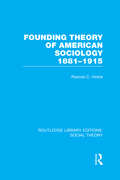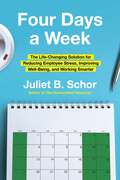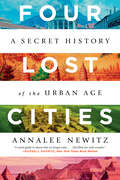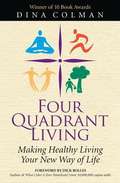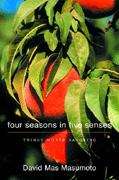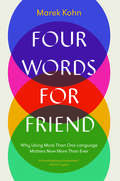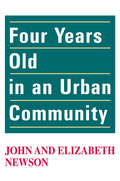- Table View
- List View
Foundations of Governance
by Andrew Sancton Robert A. YoungMunicipalities are responsible for many essential services and have become vital agents for implementing provincial policies, including those dealing with the environment, emergency planning, economic development, and land use. In Foundations of Governance, experts from each of Canada's provinces come together to assess the extent to which municipal governments have the capacity to act autonomously, purposefully, and collaboratively in the intergovernmental arena.Each chapter follows a common template in order to facilitate comparison and covers essential features such as institutional structures, municipal functions, demography, and municipal finances. Canada's municipalities function in diverse ways but have similar problems and, in this way, are illustrative of the importance of local democracy. Foundations of Governance shows that municipal governments require the legitimacy granted by a vibrant democracy in order to successfully negotiate and implement important collective choices about the futures of communities.
Foundations of Human Resource Development: Profit for Your Workplace and the Environment
by Richard A SwansonThe third edition of this classic is a must-have text for the human resource development (HRD) profession. It has with brand-new material on the impact of technology, globalization, and emerging business trends on HRD practice.Human Resource Development is a large field of practice but a relatively young academic discipline. For the last two decades, Foundations of Human Resource Development has fulfilled the field's need for a complete and thoughtful foundational text. This essential text provides an up-to-date overview of the HRD profession, along with the terminology and processes required for sound HRD research and practice. Readers will gain a basic understanding of• HRD models and theories that support best practice • History and philosophical foundations of the field• HRD's role in learning, performance, and change in organizations This new edition has been updated throughout and contains new chapters on assessment, technology, globalization, and future challenges. Examples of best practices are included, along with variations in core thinking, processes, interventions, tools, and much more. This must-have reference will help both practitioners and academics add clarity to their professional journeys.
Foundations of Human Sociality: Economic Experiments and Ethnographic Evidence from Fifteen Small-Scale Societies
by Robert Boyd Samuel Bowles Herbert Gintis Joseph Henrich Colin Camerer Ernst FehrThis path-breaking book addresses the nature of human sociality. By bringing together experimental and ethnographic data from fifteen different tribal societies, the contributors are able to explore the universality of human motives in economic decision-making, and the importance of social, institutional and cultural factors, in a manner that has been extremely rare in the social sciences. Its findings have far-reaching implications across the social sciences.
Foundations of Islāmic Psychology: From Classical Scholars to Contemporary Thinkers
by G. Hussein Rassool Mugheera M. LuqmanFoundations of Islāmic Psychology: From Classical Scholars to Contemporary Thinkers examines the history of Islāmic psychology from the Islāmic Golden age through the early 21st century, giving a thorough look into Islāmic psychology’s origins, Islāmic philosophy and theology, and key developments in Islāmic psychology. In tracing psychology from its origins in early civilisations, ancient philosophy, and religions to the modern discipline of psychology, this book integrates overarching psychological principles and ideas that have shaped the global history of Islāmic psychology. It examines the legacy of psychology from an Islāmic perspective, looking at the contributions of early Islāmic classical scholars and contemporary psychologists, and to introduce how the history of Islāmic philosophy and sciences has contributed to the development of classical and modern Islāmic psychology from its founding to the present. With each chapter covering a key thinker or moment, and also covering the globalisation of psychology, the Islāmisation of knowledge, and the decolonisation of psychology, the work critically evaluates the effects of the globalisation of psychology and its lasting impact on indigenous culture. This book aims to engage and inspire students taking undergraduate and graduate courses on Islāmic psychology, to recognise the power of history in the academic studies of Islāmic psychology, to connect history to the present and the future, and to think critically. It is also ideal reading for researchers and those undertaking continuing professional development in Islāmic psychology, psychotherapy, and counselling.
Foundations of Political Sociology
by Irving Louis HorowitzWhen initially published in 1972, Foundations of Political Sociology was acknowledged to be the first unified study of the field. It still provides a cross-fertilization of knowledge concerning the interrelation of social class and political power. Taking into account new specializations in social theory, the book covers all major social systems on a comparative international basis. The opening remarks prepared for this new printing provide an estimate of how the field has changed during the past quarter century, and what unexpected challenges have arisen in areas of public trust and personal privacy.This book examines fascism, communism, anarchism, conservatism, and liberalism as systems of rule as well as domains of theory. It is thus a unique effort at linking problems of history with problems of policy. The six sections of the book detail the historical and theoretical antecedents of this relatively new hybrid area in social research: policy coordinates of political sociology, types of social systems, forms of political ideologies, polarities of revolution and counter-revolution, civil-military relations, mass vs. elite contradictions, and threads of consensus and conflict running through these themes."Horowitz presents as his central thesis that in today's world no economic determinism can do justice to social reality. Foundations is the work of a politically sensitive and knowledgeable scholar." Louis Schneider, Social Forces"Foundations of Political Sociology reflects extensive teaching and research in the area of political sociology. The book combines analytical insight with a provocative cutting edge and represents the best of Professor Horowitz." Thomas R. McFaul, The Annals"Horowitz's political stance is interesting. Though he knows the radical literature, he distances himself from it. He sympathizes with everyone and strives to be provocative and yet elusive a personal voice in a dogmatic discipline." W.J.M. Mackenzie, Political Studies
Foundations of Security, Protocols, and Equational Reasoning: Essays Dedicated to Catherine A. Meadows (Lecture Notes in Computer Science #11565)
by Joshua D. Guttman Carl E. Landwehr José Meseguer Dusko PavlovicThis Festschrift volume is published in honor of Catherine A. Meadows and contains essays presented at the Catherine Meadows Festschrift Symposium held in Fredericksburg, VA, USA, in May 2019.Catherine A. Meadows has been a pioneer in developing symbolic formal verification methods and tools. Her NRL Protocol Analyzer, a tool and methodology that embodies symbolic model checking techniques, has been fruitfully applied to the analysis of many protocols and protocol standards and has had an enormous influence in the field. She also developed a new temporal logic to specify protocol properties, as well as new methods for analyzing various kinds of properties beyond secrecy such as authentication and resilience under Denial of Service (DoS) attacks and has made important contributions in other areas such as wireless protocol security, intrusion detection, and the relationship between computational and symbolic approaches to cryptography. This volume contains 14 contributions authored by researchers from Europe and North America. They reflect on the long-term evolution and future prospects of research in cryptographic protocol specification and verification.
Foundations of Sensation and Perception
by George MatherFoundations of Sensation and Perception offers a comprehensive and accessible introduction to the science of sensation and perception. It covers all the human senses and answers many questions, such as why movies are so convincing, how ventriloquism works, why things sound different as you get older and why you may feel ill in an aircraft or sea vessel. Full of illustrations and graphs that bring concepts to life, the textbook covers vision, hearing, balance, touch, pain, smell and taste. It discusses each sensory system through its fundamental neuroscience, major perceptual qualities and underlying coding principles. Each chapter includes reflective questions, key terms and information boxes and chapter summaries. Each chapter ends with a tutorial section which introduces more advanced areas of study in an accessible way (including measurement of light and Fourier analysis) as well as topics outside of the mainstream of sensation (including music perception, colour deficiencies and phantom limbs). The fourth edition of this bestselling textbook includes an extensive update of the text to reflect the latest research, a greater focus on balance and the body senses and a major reorganisation of the chapters for ease of use. It will be an invaluable resource for a wide range of undergraduate students in psychology, neuroscience and related disciplines.
Foundations of Social Cognition: A Festschrift in Honor of Robert S. Wyer, Jr.
by Galen V. Bodenhausen Alan J. LambertA tribute to Robert S. Wyer, Jr.'s remarkable contributions to social psychology, Foundations of Social Cognition offers a compelling analysis of the underlying processes that have long been the focus of Bob Wyer's own research, including attention, perception, inference, and memory. Leading scholars provide an in-depth analysis of these processes as they pertain to one or more substantive areas, including attitudes, construct accessibility, impressions of persons and groups, the interplay between affect and cognition, motivated reasoning, and stereotypes. Each chapter reviews and synthesizes past scholarship with the assessment of current understanding and cutting-edge trends and issues. A "must have" for scholars, researchers, and advanced students in the fields of social and cognitive psychology, as well as those in related fields such as consumer, organizational, and political psychology, neuroscience, marketing, advertising, and communication.
Foundations of Social Policy: Social Justice in Human Perspective (Sixth Edition) (Empowerment Series)
by Amanda Smith Barusch<p>Reflecting the idea that social justice is a primary mission of the social work profession, this text provides a thorough grounding in policy analysis -- with coverage of policy practice and a unique emphasis on the human dilemmas inherent in the pursuit of social justice. Aligned with current standards and core competencies, Foundations of <p>Social Policy, 6th Edition introduces you to philosophical perspectives on what constitutes social justice, and identifies values and assumptions reflected in contemporary policy debates. Students have said they like how this book deepens their understanding of current developments, including topics straight from the headlines. The book also introduces you to people whose lives are influenced by U.S. policies, as well as to those who have shaped the policies.</p>
Foundations of Social Theory: A Critical Introduction
by Neal HarrisFoundations of Social Theory: A Critical Introduction accessibly introduces students to classical and contemporary social theory, exploring the foundational theories which shape the discipline while also engaging critically with their contribution and presenting the more progressive and contemporary theorists in dialogue with canonical figures.Social theory is introduced as the construction and connection of concepts which make social inquiry possible while appreciating that the study of society is never truly objective. The relationship between positionality, politics, research, and knowledge production is discussed and ideas from critical theorists, feminist theorists, and decolonial, and critical race theorists are foregrounded. Travelling chronologically and thematically from the birth of the discipline and the work of Marx, Weber, and Durkheim through to intersectionality, queer theory, and decolonial and postcolonial theory, this book gives students a strong foundation in the broad field of social theory while also encouraging them to think critically about the theories and theorists presented.Equipped with end-of-chapter questions and further reading, this book will be essential reading for any student studying social theory for the first time.
Foundations of Sport Development
by Chris MackintoshOffering a complete introduction to sport development policy and practice, this book covers key theory, themes, issues, and debates in sport development, without assuming any prior knowledge on the part of the reader. It outlines the organisational landscape of sport in the UK and explains important differences across England, Scotland, Wales, and Northern Ireland, as well as the global context. Examining both community and elite sport, it covers public, private, and third sectors, including national and local government and national governing bodies, and considers change – cultural, managerial, social, and political – as an element of sport development policy, strategy, and operations. Every chapter includes an in-depth case study around which a seminar or tutorial can be based, as well as definitions of key concepts and terminology that students and practitioners are likely to encounter during their studies or professional practice. Questions at the end of each chapter encourage the reader to reflect on their own work, and useful guides to further reading make the book an ideal jumping off point for further study. This is the perfect foundation textbook for any sport development course taken as part of a degree program in sport development, sport management, or sport coaching.
Foundations of a Sociology of Canon Law
by Judith HahnThis "Open Access" book investigates the legal reality of the church through a sociological lens and from the perspective of canon law studies, the discipline which researches the law and the legal structure of the Catholic Church. It introduces readers from various backgrounds to the sociology of canon law, which is both a legal and a theological field of study, and is the first step towards introducing a new subdiscipline of the sociology of canon law. As a theoretical approach to mapping out this field, it asks what theology and canon law may learn from sociology; it discusses the understanding of “law” in religious contexts; studies the preconditions of legal validity and effectiveness; and based on these findings it asks in what sense it is possible to speak of canon “law”. By studying a religious order as its struggles to find a balance between continuity and change, this book also contributes to the debates on religious law in modernity and the challenges it faces from secular states and plural societies. This book is of interest to researchers and students of the sociology of law, legal studies, law and religion, the sociology of religion, theology, and religious studies.This is an open access book.
Foundations of the Frankfurt School of Social Research
by Judith T. Marcus Zoltan TarThis interdisciplinary volume provides the most comprehensive evaluation, to date, of the merits and problems of Critical Theory of the Frankfurt School. Outstanding repersentatives of several academic disciplines assess from opposite intellectual and political positions the achievements and shortcomings of the social theory that emerged from this school of thought. The volume also includes several newly translated but previously inaccessible essays by leading critical theorists such as Georg Lukács and Jürgen Habermas.
Foundations of the Psychological Intervention: A Unifying Theoretical and Methodological Framework
by Sergio Salvatore Barbara CordellaFoundations of the Psychological Intervention presents a new General Theory for Psychological Intervention (GTPI), delving into how its methodology can be applied across diverse psychological contexts.Rooted in semiotic cultural psychology and guided by the GTPI framework, this book offers a cohesive perspective of psychology, addressing the prevailing fragmentation evident in various domains of psychology such as health, sports, forensic, organisational, and clinical psychology. The framework establishes a foundation of methods and techniques that render psychological interventions applicable across various domains, substantiated by concrete examples from different areas. With chapters revolving around theories of action, change and the client dynamics, this groundbreaking work provides both a conceptual and methodological structure to underpin domain-specific theories and methodologies, thereby strengthening the conceptual links among distinct domains of psychology.As one of the first works to develop a theory and method of intervention across multiple psychological domains, this book will be of interest to postgraduate students and researchers specialising in cultural psychology, clinical psychology, health psychology, and the philosophy of psychology. Moreover, it serves as a useful reading for practising psychologists and psychology professionals.
Founders and Organizational Development: The Etiology and Theory of Founder's Syndrome (Routledge Studies in Management, Organizations and Society)
by Katrina Miller-Stevens Stephen R. BlockFounders and Organizational Development: The Etiology and Theory of Founder’s Syndrome is designed to help today’s researchers, faculty, students and practitioners become familiar with the etiology and dynamics of Founder’s Syndrome as an organizational condition challenging nonprofit/nongovernmental, social enterprise, and for-profit and publicly traded organizations. The book uses applied social and psychological theories and concepts to peel away the layers of an organizational enigma, revealing three causes of Founder’s Syndrome and insight into the power and privileges assumed by founders who engage in undesirable and self-destructive behaviors leading to their termination; going from hero status to antihero. Researchers, instructors, students, and practitioners will find thought-provoking case studies from the real world of organization development practice. Segments from interviews during interventions reveal the type of emotional turmoil experienced in organizations where founder’s syndrome is present. Insight is provided into accounts of well-known founders who were terminated or forced to resign. The unique features of this book include: integrating theory into practice, describing a new theory about the psychological reaction of founder’s syndrome victims, prevention ideas when designing new organizations, strategies for intervention, using content based on research and organization development consultation experiences, and, integrating feedback from students who have launched organizations.
Founders as Fathers
by Lorri GloverSurprisingly, no previous book has ever explored how family life shaped the political careers of America's great Founding Fathers--men like George Mason, Patrick Henry, George Washington, Thomas Jefferson, and James Madison. In this original and intimate portrait, historian Lorri Glover brings to life the vexing, joyful, arduous, and sometimes tragic experiences of the architects of the American Republic who, while building a nation, were also raising families. The costs and consequences for the families of these Virginia leaders were great, Glover discovers: the Revolution remade family life no less than it reinvented political institutions. She describes the colonial households that nurtured future revolutionaries, follows the development of political and family values during the revolutionary years, and shines new light on the radically transformed world that was inherited by nineteenth-century descendants. Beautifully written and replete with fascinating detail, this groundbreaking book is the first to introduce us to the founders as fathers.
Founders, Classics, Canons: Modern Disputes Over the Origins and Appraisal of Sociology's Heritage
by Peter BaehrFounders, classics, and canons have been vitally important in helping to frame sociology's identity. Within the academy today, a number of positions�feminist, postmodernist, postcolonial�question the status of "tradition."In Founders, Classics, Canons, Peter Baehr defends the continuing importance of sociology's classics and traditions in a university education. Baehr offers arguments against interpreting, defending, and attacking sociology's great texts and authors in terms of founders and canons. He demonstrates why, in logical and historical terms, discourses and traditions cannot actually be "founded" and why the term "founder" has little explanatory content. Equally, he takes issue with the notion of "canon" and argues that the analogy between the theological canon and sociological classic texts, though seductive, is mistaken.Although he questions the uses to which the concepts of founder, classic, and canon have been put, Baehr is not dismissive. On the contrary, he seeks to understand the value and meaning these concepts have for the people who employ them in the cultural battle to affirm or attack the liberal university tradition.
Founding Sociology? Talcott Parsons and the Idea of General Theory.
by John HolmwoodThe theories of Talcott Parsons' are enjoying a revival in the world of sociology. Rather than following closely the complex original prose in an effort to explain the theory in its minutiae, Holmwood presents a highly readable non-technical critique of several of the strongest underlying sociological themes and shows how, although flawed in many respects, these themes have been recurring, in different forms, in the theories of those critical of his work.
Founding Theory of American Sociology, 1881-1915 (Routledge Library Editions: Social Theory Ser.)
by Roscoe C. HinkleBased on a comparative study of the theories of such sociologists as Ward, Sumner, Keller, Giddings, Ross, Small and Cooley, this is a systematic and rigorous analysis of the main features of earlier sociological theory in the USA. The author identifies and characterizes the basic assumptions of early American sociological thought in terms of an abstract analytical scheme. He shows that early theory focused on social ontological interests, the pervasive ontological stance being evolutionary naturalism, within which the problems of social origins and social change tended to be paramount. He also points out that some sociologists preferred a social process theory. In his final chapter the author suggests the degree of similarity and dissimilarity, of continuity and discontinuity, between earlier and later theory in American sociology, and provides a basis for explaining and interpreting the character of the prevalent assumptions of one period in American theory in relation to other periods.
Four Days a Week: The Life-Changing Solution for Reducing Employee Stress, Improving Well-Being, and Working Smarter
by Juliet Schor ProfessorBestselling author, leading sociologist and economist Juliet Schor makes the case for a four-day work week, persuasively showing how this model can address major challenges such as burnout, AI and the climate crisis, and how employees, companies, and governments can work together to make it a reality. Around the world, long hours and intense pressure are taking their toll. When the pandemic hit in 2020, work-induced stress and burnout skyrocketed. Many reached a breaking point. Now, three-quarters of the world’s employees are disengaged and struggling, including in the US and Canada, where half are experiencing high levels of daily stress.Our current work culture ,the five-day, forty-hours-a-week model—which has gone unchanged for nearly a century—is failing. But a remedial countertrend has emerged: the four-day work week. Kickstarter, Bolt, Basecamp, ThredUp, and hundreds of other employers have eliminated the fifth day of work, successfully figuring out how to maintain productivity while seeing remarkable improvements in employee well-being. Hiring is easier and fewer people are quitting. These results are global. Working a four-day week, people feel energized, capable, and more optimistic about their lives—and their jobs.Four Days a Week is the first large-scale study of this trend. Juliet Schor—an expert who has researched and written about work for more than four decades, beginning with her New York Times bestseller The Overworked American in 1992—shares her pioneering analysis of the benefits of a shorter work week, how companies can achieve them, why the concept has taken so long to emerge and gain acceptance, and why doing so will help a company’s employees and its bottom line. The book is a blueprint for implementing a change that once seemed radical, but is now within reach.
Four Lost Cities: A Secret History Of The Urban Age
by Annalee NewitzA quest to explore some of the most spectacular ancient cities in human history—and figure out why people abandoned them. In Four Lost Cities, acclaimed science journalist Annalee Newitz takes readers on an entertaining and mind-bending adventure into the deep history of urban life. Investigating across the centuries and around the world, Newitz explores the rise and fall of four ancient cities, each the center of a sophisticated civilization: the Neolithic site of Çatalhöyük in Central Turkey, the Roman vacation town of Pompeii on Italy’s southern coast, the medieval megacity of Angkor in Cambodia, and the indigenous metropolis Cahokia, which stood beside the Mississippi River where East St. Louis is today. Newitz travels to all four sites and investigates the cutting-edge research in archaeology, revealing the mix of environmental changes and political turmoil that doomed these ancient settlements. Tracing the early development of urban planning, Newitz also introduces us to the often anonymous workers—slaves, women, immigrants, and manual laborers—who built these cities and created monuments that lasted millennia. Four Lost Cities is a journey into the forgotten past, but, foreseeing a future in which the majority of people on Earth will be living in cities, it may also reveal something of our own fate.
Four Quadrant Living: Making Healthy Living Your New Way of Life
by Dina ColmanLiving healthy doesn't need to be complicated. Four Quadrant Living shows readers how to take responsibility for their own health by providing logically organized and easily implemented ideas and suggestions for nourishing the "four quadrants" of our lives. The book includes ways to reduce stress, live mindfully, eat well, exercise more, sleep better, engage in healthy relationships, and detoxify environments. Many people worry about getting cancer, diabetes, Alzheimer's disease, or heart disease because it "runs in the family." This attitude encourages a passive, out-of-my-hands approach. Instead, Four Quadrant Living offers a new prescription for health, one that emphasizes positive steps readers can take to make healthy living a part of their daily routine. Four Quadrant Living provides simple, effective, and natural ways to help readers take control of their health so that they feel empowered, beat the odds, and live radiantly. We may be eating well and exercising, but we cannot truly be healthy if our mind is stressed, our relationships are toxic, and our world is sick. Every day we make choices that impact our health-the foods we eat, the products we use, the exercise we get, the stress we allow, the people we surround ourselves with, and the environment we live in. Four Quadrant Living guides readers to make healthy living a part of their daily lives, leading to abundant health, vitality, and happiness.
Four Seasons in Five Senses: Things Worth Savoring
by David Mas MasumotoIn our day to day busy schedules we lose sight of the art of living, which for California farmer David Mas Masumoto is also the art of farming. Taking us into his fields to witness the cycle of the harvest, Masumoto reminds us that we must stop living on the run in order to savor the world around us.
Four Words for Friend: Why Using More Than One Language Matters Now More Than Ever
by Marek KohnA compelling argument about the importance of using more than one language in today’s world In a world that has English as its global language and rapidly advancing translation technology, it’s easy to assume that the need to use more than one language will diminish—but Marek Kohn argues that plural language use is more important than ever. In a divided world, it helps us to understand ourselves and others better, to live together better, and to make the most of our various cultures. Kohn, whom the Guardian has called “one of the best science writers we have,” brings together perspectives from psychology, evolutionary thought, politics, literature, and everyday experience. He explores how people acquire languages; how they lose them; how they can regain them; how different languages may affect people’s perceptions, their senses of self, and their relationships with each other; and how to resolve the fundamental contradiction of languages, that they exist as much to prevent communication as to make it happen.
Four Years Old in an Urban Community
by Elizabeth Newson John NewsonAlthough psychologists by training, John and Elizabeth Newson have more aptly been described as pioneers in social ecology; they work from the conviction that the causes and the consequences of child-rearing attitudes can fruitfully be investigated only in the framework of the total social environment in which they occur. This book continues their analysis of child rearing in an English urban setting.

